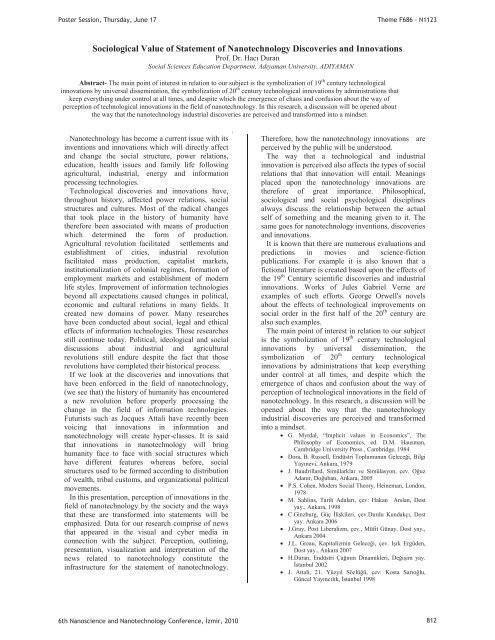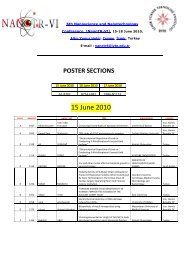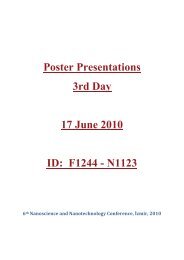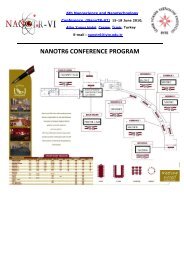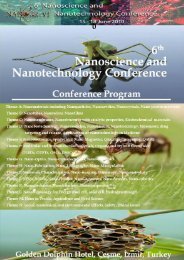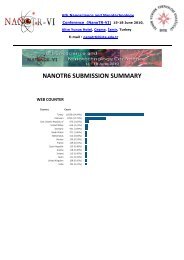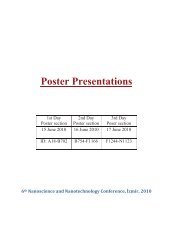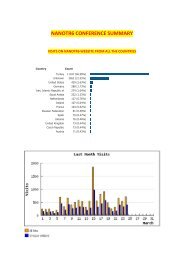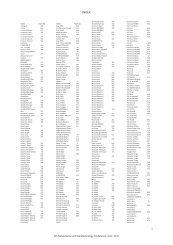Third Day Poster Session, 17 June 2010 - NanoTR-VI
Third Day Poster Session, 17 June 2010 - NanoTR-VI
Third Day Poster Session, 17 June 2010 - NanoTR-VI
Create successful ePaper yourself
Turn your PDF publications into a flip-book with our unique Google optimized e-Paper software.
<strong>Poster</strong> <strong>Session</strong>, Thursday, <strong>June</strong> <strong>17</strong><br />
Theme F686 - N1123<br />
Sociological Value of Statement of Nanotechnology Discoveries and Innovations<br />
Prof. Dr. Hacı Duran<br />
Social Sciences Education Department, Adıyaman University, ADIYAMAN<br />
Abstract- The main point of interest in relation to our subject is the symbolization of 19 th century technological<br />
innovations by universal dissemination, the symbolization of 20 th century technological innovations by administrations that<br />
keep everything under control at all times, and despite which the emergence of chaos and confusion about the way of<br />
perception of technological innovations in the field of nanotechnology. In this research, a discussion will be opened about<br />
the way that the nanotechnology industrial discoveries are perceived and transformed into a mindset.<br />
.<br />
Nanotechnology has become a current issue with its<br />
inventions and innovations which will directly affect<br />
and change the social structure, power relations,<br />
education, health issues and family life following<br />
agricultural, industrial, energy and information<br />
processing technologies.<br />
Technological discoveries and innovations have,<br />
throughout history, affected power relations, social<br />
structures and cultures. Most of the radical changes<br />
that took place in the history of humanity have<br />
therefore been associated with means of production<br />
which determined the form of production.<br />
Agricultural revolution facilitated settlements and<br />
establishment of cities, industrial revolution<br />
facilitated mass production, capitalist markets,<br />
institutionalization of colonial regimes, formation of<br />
employment markets and establishment of modern<br />
life styles. Improvement of information technologies<br />
beyond all expectations caused changes in political,<br />
economic and cultural relations in many fields. It<br />
created new domains of power. Many researches<br />
have been conducted about social, legal and ethical<br />
effects of information technologies. Those researches<br />
still continue today. Political, ideological and social<br />
discussions about industrial and agricultural<br />
revolutions still endure despite the fact that those<br />
revolutions have completed their historical process.<br />
If we look at the discoveries and innovations that<br />
have been enforced in the field of nanotechnology,<br />
(we see that) the history of humanity has encountered<br />
a new revolution before properly processing the<br />
change in the field of information technologies.<br />
Futurists such as Jacques Attali have recently been<br />
voicing that innovations in information and<br />
nanotechnology will create hyper-classes. It is said<br />
that innovations in nanotechnology will bring<br />
humanity face to face with social structures which<br />
have different features whereas before, social<br />
structures used to be formed according to distribution<br />
of wealth, tribal customs, and organizational political<br />
movements.<br />
In this presentation, perception of innovations in the<br />
field of nanotechnology by the society and the ways<br />
that these are transformed into statements will be<br />
emphasized. Data for our research comprise of news<br />
that appeared in the visual and cyber media in<br />
connection with the subject. Perception, outlining,<br />
presentation, visualization and interpretation of the<br />
news related to nanotechnology constitute the<br />
infrastructure for the statement of nanotechnology.<br />
Therefore, how the nanotechnology innovations are<br />
perceived by the public will be understood.<br />
The way that a technological and industrial<br />
innovation is perceived also affects the types of social<br />
relations that that innovation will entail. Meanings<br />
placed upon the nanotechnology innovations are<br />
therefore of great importance. Philosophical,<br />
sociological and social psychological disciplines<br />
always discuss the relationship between the actual<br />
self of something and the meaning given to it. The<br />
same goes for nanotechnology inventions, discoveries<br />
and innovations.<br />
It is known that there are numerous evaluations and<br />
predictions in movies and science-fiction<br />
publications. For example it is also known that a<br />
fictional literature is created based upon the effects of<br />
the 19 th Century scientific discoveries and industrial<br />
innovations. Works of Jules Gabriel Verne are<br />
examples of such efforts. George Orwell's novels<br />
about the effects of technological improvements on<br />
social order in the first half of the 20 th century are<br />
also such examples.<br />
The main point of interest in relation to our subject<br />
is the symbolization of 19 th century technological<br />
innovations by universal dissemination, the<br />
symbolization of 20 th century technological<br />
innovations by administrations that keep everything<br />
under control at all times, and despite which the<br />
emergence of chaos and confusion about the way of<br />
perception of technological innovations in the field of<br />
nanotechnology. In this research, a discussion will be<br />
opened about the way that the nanotechnology<br />
industrial discoveries are perceived and transformed<br />
into a mindset.<br />
G. Myrdal, “Implicit values in Economics”, The<br />
Philosophy of Economics, ed. D.M. Hausman,<br />
Cambridge University Press , Cambridge, 1984<br />
Dora, B. Russell, Endüstri Toplumunun Geleceği, Bilgi<br />
Yayınevi, Ankara, 1979<br />
J. Baudrillard, Simülarklar ve Simülasyon, çev. Oğuz<br />
Adanır, Doğubatı, Ankara, 2005<br />
P.S. Cohen, Moders Social Theory, Heineman, London,<br />
1978<br />
M. Sahlins, Tarih Adaları, çev: Hakan Arslan, Dost<br />
yay., Ankara, 1998<br />
C.Ginzburg, Güç İlişkileri, çev.Durdu Kundakçı, Dost<br />
yay. Ankara 2006<br />
J.Gray, Post Liberalizm, çev., Müfit Günay, Dost yay.,<br />
Ankara 2004<br />
J.L. Greau, Kapitalizmin Geleceği, çev. Işık Ergüden,<br />
Dost yay., Ankara 2007<br />
H.Duran, Endüstri Çağının Dinamikleri, Değişim yay.<br />
İstanbul 2002<br />
J. Attali, 21. Yüzyıl Sözlüğü, çev: Kosta Sarıoğlu,<br />
Güncel Yayıncılık, İstanbul 1998<br />
6th Nanoscience and Nanotechnology Conference, zmir, <strong>2010</strong> 812


